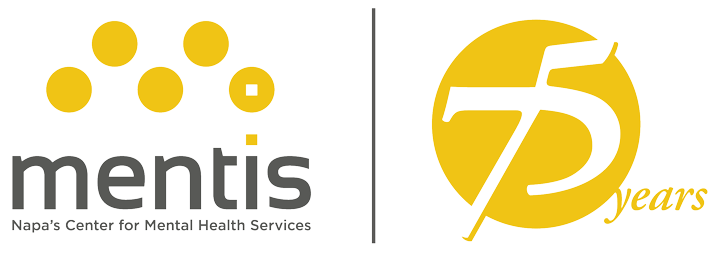Originally Published in the Napa Valley Features on November 28th, 2023
By Jeni Olsen, Mentis Prevention Director
NAPA VALLEY, Calif. — Fall is the season of gratitude. Changes in light and temperature can lead us to naturally spend more time in reflection as we head toward the holidays and into the winter months. We might reflect over the past year or think ahead to plans and goals for the coming new year. Starting a gratitude practice is beneficial at any time, but it lends itself well to the slower pace of autumn.
You’ve likely heard that practicing gratitude is good for our mental and emotional health. It can boost self-esteem, improve relationships and reduce stress levels. It also offers a host of physical health benefits, including decreased inflammation and lowered blood pressure. Studies show that practicing gratitude in combination with receiving therapy can greatly enhance therapeutic benefits. It boosts neural pathways in our brain that create positive emotions of happiness and well-being.
Bottom of Form
To help us understand the positive effects gratitude can have on our mental health, I posed the following questions for Karina Aguilar Sanchez, a clinical therapist at Mentis who works with youth. Our conversation has been condensed and edited for clarity.
Please share about the work you do at Mentis.
I am a bilingual school therapist at Mentis. I work within schools in the Napa Valley Unified School District to provide therapy services for students who require mental-health support and struggle to receive support outside of school. I work with young people from first grade through seniors in high school. Most of the parents of my younger clients are monolingual Spanish-speaking and appreciate having a bilingual, bicultural professional who understands and speaks to them in their language about what their children are going through and how they can support them at home.
Do you incorporate gratitude with your clients?
Yes, I do. I make sure at least one session with every one of my clients highlights the benefits of gratitude. With some of the youth I work with, we begin every session by listing things we are grateful for. The ability to find gratitude in one’s life is like a muscle – the more we use it, the stronger the muscle is. Likewise, if we don’t use our gratitude muscle for a while, it might be hard to start or find the same levels of gratitude as before. I share about the benefits of starting and continuing a gratitude practice.
Studies have found that a single act of thoughtful gratitude produces an immediate 10% increase in happiness and a 35% reduction in depressive symptoms. These effects disappeared within three to six months, which reminds us to practice gratitude over and over.
Can practicing gratitude reduce feelings of depression?
I was fortunate to personally experience how gratitude can support a loved one during a depressive phase of their life. A close friend was going through a difficult breakup. To support her I bought an inexpensive journal, and we passed it back and forth. We took turns writing at least five things we were grateful for every day. As time went on and we continued to fill the pages of the journal, I noticed that my friend was able to find more positivity in her life. When we started this practice, she had a hard time thinking of even one or two things to be grateful for, and in the end she was easily able to think of 10 things. The gratitude journal encouraged us to grow our gratitude muscles and reflect on our shared growth.
Gratitude can help us feel more positive emotions. Why is this important for good mental health?
We are a mixture of positive and negative emotions. Nowadays we receive so much negativity from our environment – from the news, social media, and even within our families and social circles. An unbalanced amount of negativity in our lives can lead to depression, anxiety, and feelings of isolation and loneliness. To bring balance to our emotional lives, we must practice feeling positive emotions. Gratitude is a simple method to access positive emotions, as it shifts attention away from negative or toxic emotions. When you focus on positive feelings, it’s harder to ruminate on negative ones.
Gratitude is a skill I’ve learned to appreciate more throughout the years. I didn’t realize all the benefits of having and sharing gratitude until I was in my master’s program for social work. During that time I was immersed in a safe environment where we shared gratitude with each other. I was able to feel more connected to the people around me. It was uplifting to share my gratitude with others and for others to give some gratitude back.
What’s a good way to start practicing gratitude?
Find a quiet time and place where you can be alone every day, even for five minutes. Think of something for which you are grateful and either silently or say out loud, “I am thankful for (thing you are grateful for).” Then think of someone you are grateful for and either silently or say out loud, “I give thanks to (name of person).” Writing down what you’re grateful for can be another way to express your gratitude, and it can be fun to have a written record of positive feelings.
For families with children at home, find a time and place to practice gratitude together, such as around the dinner table. Give each family member an opportunity to share what they are grateful for in that moment or from that day. In practicing this habit as a family, you may be setting your children up for a happier, healthier life.
. . . . . . . . . . . . . . . . . . . . . . . . . . . . . . . . . . . . . . . . . . . .
“Expressing gratitude can positively change your brain,” says Kristin Francis, a psychiatrist at Huntsman Mental Health Institute. “It boosts dopamine and serotonin, the neurotransmitters in the brain that improve your mood immediately, giving you those positive feelings of pleasure, happiness and well-being.”
I used to focus on the big things I was grateful for — my health, my family, my career. These are certainly important, but as I’ve strengthened my gratitude practice I’ve started noticing and finding meaning in the small, simple things that bring me joy. A fall leaf letting go and fluttering to the ground, that first sip of hot coffee early in the morning. I’ve also learned to notice and appreciate my own good qualities, such as the way I make someone feel. As I mentioned in my last column, I suffer from seasonal depression. I make sure this time of year includes a daily gratitude practice, as it helps me focus on moments that bring joy and contentment rather than ruminate on things that are going wrong or difficult. Our daily lives are full of distractions. I encourage you to take a few moments every day to say, think about or write down three things for which you are grateful.
. . . . . . . . . . . . . . . . . . . . . . . . . . . . . . . . . . . . . . . . . . . .
If you or someone you love is experiencing a mental-health crisis, call or text the 988 Suicide and Crisis Lifeline.
If you or someone you love needs mental-health or wellness support, please visit our Mentis Youth Resource Database. Mentis is one of Napa’s oldest nonprofits and provides bilingual, affordable mental-health services to people of every age and income level.
Bottom of Form
Jeni Olsen is the founder of Teens Connect and director of Mentis’ Prevention Division. She manages youth wellness programs through a mental-health lens together with local teenagers and her Prevention team. As a director, speaker and writer, she is often sought out for her in-depth expertise around teens and her forward-thinking, collaborative approach to supporting youth and their complex needs.


